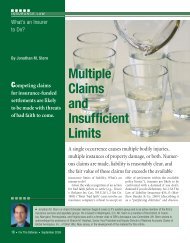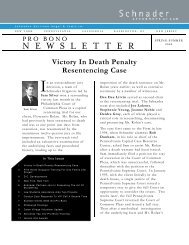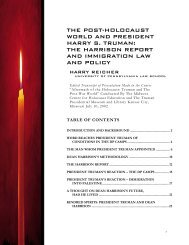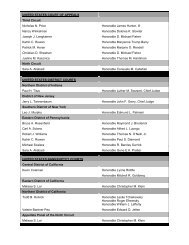Filed the first CD-ROM brief in the U.S. Supreme Court - Schnader ...
Filed the first CD-ROM brief in the U.S. Supreme Court - Schnader ...
Filed the first CD-ROM brief in the U.S. Supreme Court - Schnader ...
You also want an ePaper? Increase the reach of your titles
YUMPU automatically turns print PDFs into web optimized ePapers that Google loves.
First <strong>CD</strong>-<strong>ROM</strong> Brief Accepted by <strong>Supreme</strong> <strong>Court</strong><br />
Page 7 of 31<br />
Appellants,<br />
v.<br />
American Civil Liberties Union, et al.,<br />
Appellees.<br />
BRIEF OF AMICI CURIAE AMERICAN<br />
ASSOCIATION OF UNIVERSITY PROFESSORS, ET<br />
AL. IN SUPPORT OF APPELLEES<br />
The decision below correctly held that provisions of <strong>the</strong> Communications Decency Act of 1996<br />
("<strong>CD</strong>A"), 47 U.S.C. § 223(a) & (d), as amended, 1 that crim<strong>in</strong>alize "<strong>in</strong>decent" and "patently offensive"<br />
speech on <strong>the</strong> <strong>in</strong>ternational computer network known as <strong>the</strong> Internet impermissibly <strong>in</strong>fr<strong>in</strong>ge rights of<br />
communication under <strong>the</strong> First Amendment and must be enjo<strong>in</strong>ed from enforcement. If not enjo<strong>in</strong>ed, <strong>the</strong><br />
statute will deprive both adults and m<strong>in</strong>ors of <strong>in</strong>formation that is essential to <strong>the</strong>ir health and well-be<strong>in</strong>g.<br />
The statute is unconstitutionally overbroad <strong>in</strong> crim<strong>in</strong>aliz<strong>in</strong>g non-obscene speech that has any connection<br />
with sexual topics, despite <strong>the</strong> fact that <strong>the</strong> speech possesses serious literary, artistic, political, or<br />
scientific value and is protected by <strong>the</strong> First and Fifth Amendments.<br />
[P. 2]<br />
STATEMENT OF INTEREST OF AMICI CURIAE<br />
Amici are a diverse group of 25 <strong>in</strong>dividuals and organizations that use <strong>the</strong> Internet, and <strong>in</strong>clude Internet<br />
service providers ("ISPs"), over whose l<strong>in</strong>es speech targeted by <strong>the</strong> <strong>CD</strong>A is carried; <strong>in</strong>dividuals and<br />
organizations who place on <strong>the</strong> Internet speech and o<strong>the</strong>r forms of expression on wide-rang<strong>in</strong>g subjects;<br />
<strong>in</strong>dividuals and organizations that access <strong>the</strong> Internet to receive speech on diverse topics; and o<strong>the</strong>rs who<br />
require and believe firmly <strong>in</strong> freedom of expression <strong>in</strong> connection with <strong>the</strong>ir use of <strong>the</strong> Internet. Many<br />
are <strong>in</strong>dividuals for whom <strong>the</strong> Internet provides an unprecedented opportunity to publish and dissem<strong>in</strong>ate<br />
speech on issues that <strong>the</strong>y consider important. Some are educators who use <strong>the</strong> Internet for both teach<strong>in</strong>g<br />
and research. A complete list of amici, with descriptions of <strong>the</strong>ir use of <strong>the</strong> Internet, <strong>the</strong>ir <strong>in</strong>terest <strong>in</strong> this<br />
litigation, and <strong>the</strong> impact that <strong>the</strong> <strong>CD</strong>A has had (and would cont<strong>in</strong>ue to have if enforced) on <strong>the</strong>ir<br />
vary<strong>in</strong>g uses of <strong>the</strong> Internet, is set forth <strong>in</strong> a more detailed Statement of Interest of Amici Curiae that is<br />
appended to this <strong>brief</strong>. All parties have consented to <strong>the</strong> fil<strong>in</strong>g of this <strong>brief</strong>, and letters of consent are<br />
be<strong>in</strong>g lodged with <strong>the</strong> Clerk.<br />
Amici have <strong>the</strong> unique ability <strong>in</strong> this litigation to illustrate one of <strong>the</strong> fatal flaws <strong>in</strong> <strong>the</strong> <strong>CD</strong>A: its broad<br />
sweep that is <strong>the</strong> anti<strong>the</strong>sis of a narrowly tailored <strong>in</strong>fr<strong>in</strong>gement on protected speech. As users of <strong>the</strong><br />
Internet, amici are directly affected by <strong>the</strong> deterrence of speech that <strong>the</strong> <strong>CD</strong>A's overbreadth causes. In<br />
some cases, amici are deterred <strong>the</strong>mselves from engag<strong>in</strong>g <strong>in</strong> speech because of fear of prosecution under<br />
<strong>the</strong> statute. In o<strong>the</strong>r cases, amici are deprived of important <strong>in</strong>formation because <strong>the</strong> statute's deterrent<br />
effect causes o<strong>the</strong>rs to make <strong>in</strong>formation unavailable. In ei<strong>the</strong>r event, <strong>the</strong> <strong>CD</strong>A impermissibly <strong>in</strong>fr<strong>in</strong>ges<br />
file://C:\Documents and Sett<strong>in</strong>gs\u0072943\Desktop\Brief.htm<br />
7/11/2008







